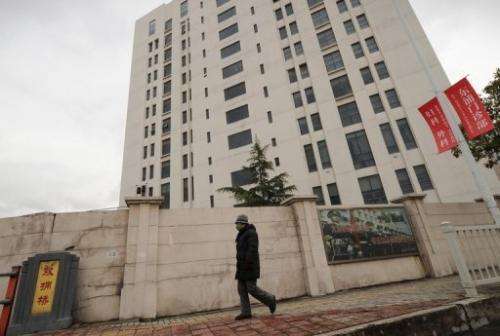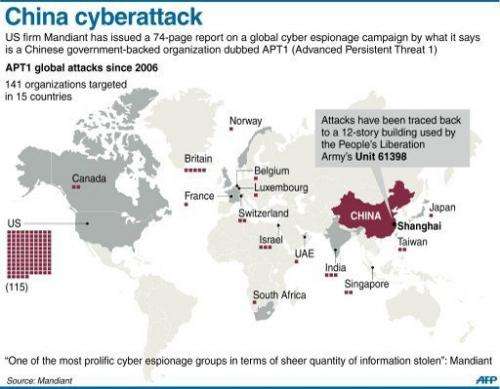A man walks past a building alleged, in a report on February 19, 2013 by the Internet security firm Mandiant, to be the base of a Chinese military-led hacking group in Shanghai. China is pouring massive amounts of money and resources into cyberattacks aimed at stealing business secrets, security researchers have told a congressional panel.
China is pouring massive amounts of money and resources into cyberattacks aimed at stealing business secrets, security researchers told a congressional panel.
Cyberattacks purported to come from China, a topic which has drawn the attention of US President Barack Obama and other top officials, are part of "an extensive effort to pilfer intellectual property," said Kevin Mandia, head of the security firm Mandiant.
"It's been supported monetarily," said Mandia, whose firm released a report earlier this year linking the People's Liberation Army to a long-running cyber espionage campaign.
"It would take thousands of people, thousands of systems... the mere infrastructure alone, and the time, and duration and scope of this effort to steal our secrets has gone on for so long that there's a large amount of investment in it."
Mandia told a hearing of the Senate Armed Services Committee that "based on that investment, it's hard to conclude anything other than that there's an advantage being gained from that investment."
Richard Bejtlich, Mandiant's chief security officer, said the army unit identified in the report is "just one element of a large campaign."
Graphic showing reported attacks by an alleged Chinese government-backed cyber espionage group dubbed APT1, according to a report by US security firm Mandiant.
"There are other teams working in other cities in other parts of the country that, in some cases, target other areas of the economy," he added.
Based on the firm's investigation, "We can say with confidence that they're Chinese units... I would say they're at least government sanctioned. We can't say for sure these other units, whether they are uniform-wearing military or if they're contractors or if they're outsourced third parties."
Mandia said the methods of the attacks suggest clear economic goals.
"These attacks are against companies," he said. "They're not against individuals at the highest levels. It's to steal corporate secrets; it's not individual secrets, necessarily."
He added that most of the attacks are carried out by luring people to open infected emails which allow outsiders access to networks.
"But they are not targeting an individual at home. And it's very clear to us after responding to Chinese intrusions for nearly 15 years now in my career, the attacks do follow a rule of engagement," he said.
"I've never witnessed Chinese intruders—other than breach the confidentiality of your documents, I've never seen them change things."
Obama earlier this month pledged "some pretty tough talk" with China and added that "we've made it very clear to China and some other state actors that, you know, we expect them to follow international norms and abide by international rules."
China has consistently denied the charges, and also claimed that it was a victim of such attacks.
In its report, Mandiant alleged that APT1—known also as "Comment Crew" for its practice of planting viruses on the comment sections of websites—has stolen hundreds of terabytes of data from at least 141 organizations spanning 20 industries.
(c) 2013 AFP























